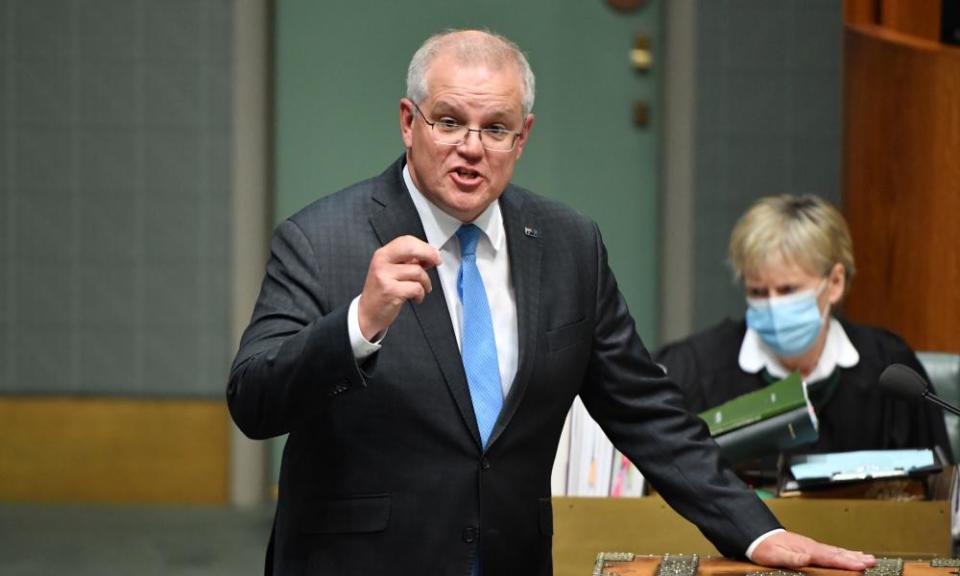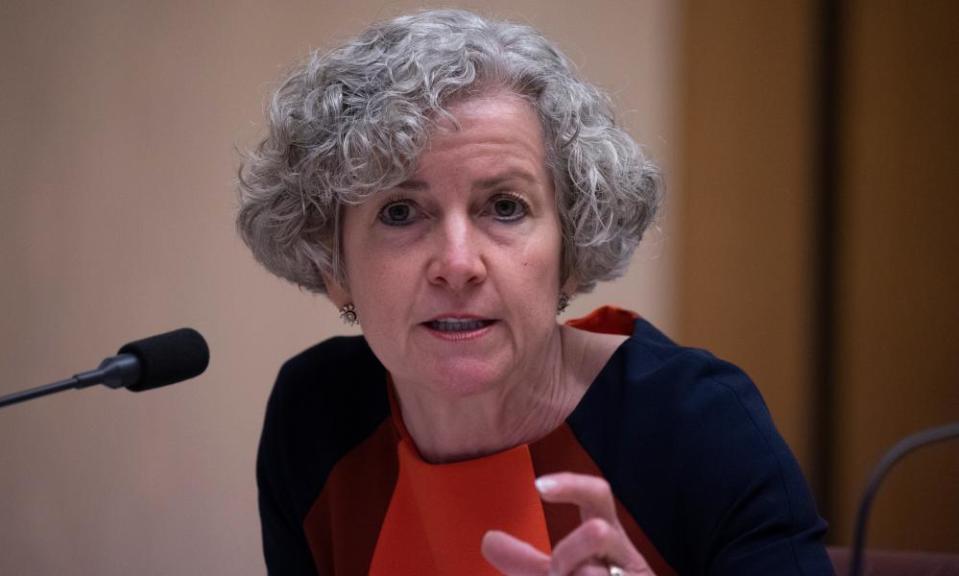PM's department says business leaders on Covid commission given access to confidential material

Officials from Scott Morrison’s department have confirmed the high powered business leaders on Nev Power’s Covid coordination commission have been given “baseline” security clearances so they can have access to confidential cabinet material.
The prime minister first flagged the highly unusual governance arrangement in the middle of the year when he broadened the membership of the business advisory body he created to assist the government with Covid-19 recovery.
Morrison told reporters in July it would be an “important innovation” to allow the coordination commission, which is headed by former Fortescue executive Power, “to work within government and … form part of the cabinet deliberative processes”.
Related: Putin's blacklisted oligarch ally to cash in from Morrison government's gas-led recovery
Stephanie Foster, the deputy secretary of the Department of Prime Minister and Cabinet, told a Senate estimates hearing on Tuesday that officials had subsequently “initiated a process” whereby the commissioners were given a “baseline security clearance to facilitate this”.
Power told the committee that commissioners had provided “input” to high-level government decisions, including on the operation of the jobseeker and jobkeeper payments. He said the coordination commission had made contributions in the lead-up to the October budget and confirmed he had provided briefings to the national security committee of federal cabinet.
Foster said departmental officials supporting Power’s advisory group had access to cabinet material and could use that material as the basis of briefings for the organisation.
The shadow finance minister, Katy Gallagher, criticised the arrangement as “cosy”. Gallagher noted during Tuesday’s hearing the practical effect of the change was business leaders now had more access to government information than the Liberal and National members serving with her on the finance committee.
She challenged the finance minister, Mathias Cormann, to nominate a comparable arrangement with a government advisory group being given access to confidential material.
But Cormann played down the significance of the shift. “Why would we have an advisory body if we didn’t seek their advice. You can’t ask them to do this job with two arms tied behind their back.”

Cormann argued the handpicked group needed tools to do their job “for Australia” effectively.
Gallagher noted the government had chosen in the budget not to extend the jobseeker payment beyond December. She asked Power whether that reflected his advice to government. Cormann said the commission was one “input” but he shut the line of questioning down because it strayed into confidential deliberations of government.
Gallagher said there was a persistent problem with transparency with the organisation. She noted the Covid commission was being being funded by taxpayers but taxpayers had little sense of how the organisation worked.
There has been criticism from a range of civil society groups about a lack of accountability procedures at the commission. As well as the criticism about governance, there has been concern the group’s policy and advisory focus is too narrow.
Power’s role leading the National Covid-19 Coordination Commission raised concerns about potential conflicts of interest because of an early apparent emphasis on pursuing a gas-led recovery. Power in May stepped aside from his position as deputy chairman of gas company Strike Energy.
The concern intensified after the leak of a draft report by a manufacturing taskforce appended to the commission recommended the government make sweeping changes to “create the market” for gas and build fossil fuel infrastructure that would operate for decades.
That report – which has not been released officially – said Australian taxpayers should underwrite a massive expansion of the domestic gas industry, including helping open new fields and build hundreds of kilometres of pipelines.
The Morrison government is pursuing a “gas-led” recovery which includes opening new gas basins and potentially supporting infrastructure.
Power was asked on Tuesday by the Greens senator Larissa Waters whether the NCCC had applied a climate lens to its deliberations. Power said the organisation sought a range of inputs, including from Australia’s chief scientist Alan Finkel, but replied: “I’m not sure what you mean by a climate lens.”
Power said the commission was focussed on pursuing policies and programs that accelerated Australia’s recovery from the first recession in 30 years.
The IMF recently pointed out that one of the most effective means of boosting economic growth post-Covid would be a green led recovery using policy architecture that the Coalition abolished when it came to power in 2013.
Related: Afghan asylum seeker sues for false imprisonment in 'cockroach-infested' Australian facility
Power has noted previously that he has been approached by business leaders wanting the government to use the recovery from the pandemic to lock in low-emissions energy. But he says his organisation is not recommending “a green recovery per se”.
The Morrison government has also come under fire for attempting to use cabinet confidentiality to protect the deliberations of national cabinet, the body consisting of the prime minister and leaders of the states and territories.
Independent senator Rex Patrick has challenged the status of the intergovernmental body, arguing in a freedom-of-information appeal that it “is not a cabinet” because it is “not constituted by members of government responsible to one parliament”.
Patrick noted that on Monday the department had quietly updated the cabinet handbook to include the national cabinet. It now states that all national cabinet documents “remain strictly confidential” and the body can “co-opt” expert advisers into its structure “as appropriate”.
On Tuesday, Patrick said he would fight the “power grab” through his FOI appeal in the Administrative Appeals Tribunal and predicted it will “prove a major legal battle on the future of cabinet government in Australia, likely ending up in the high court”.

 Yahoo News
Yahoo News 